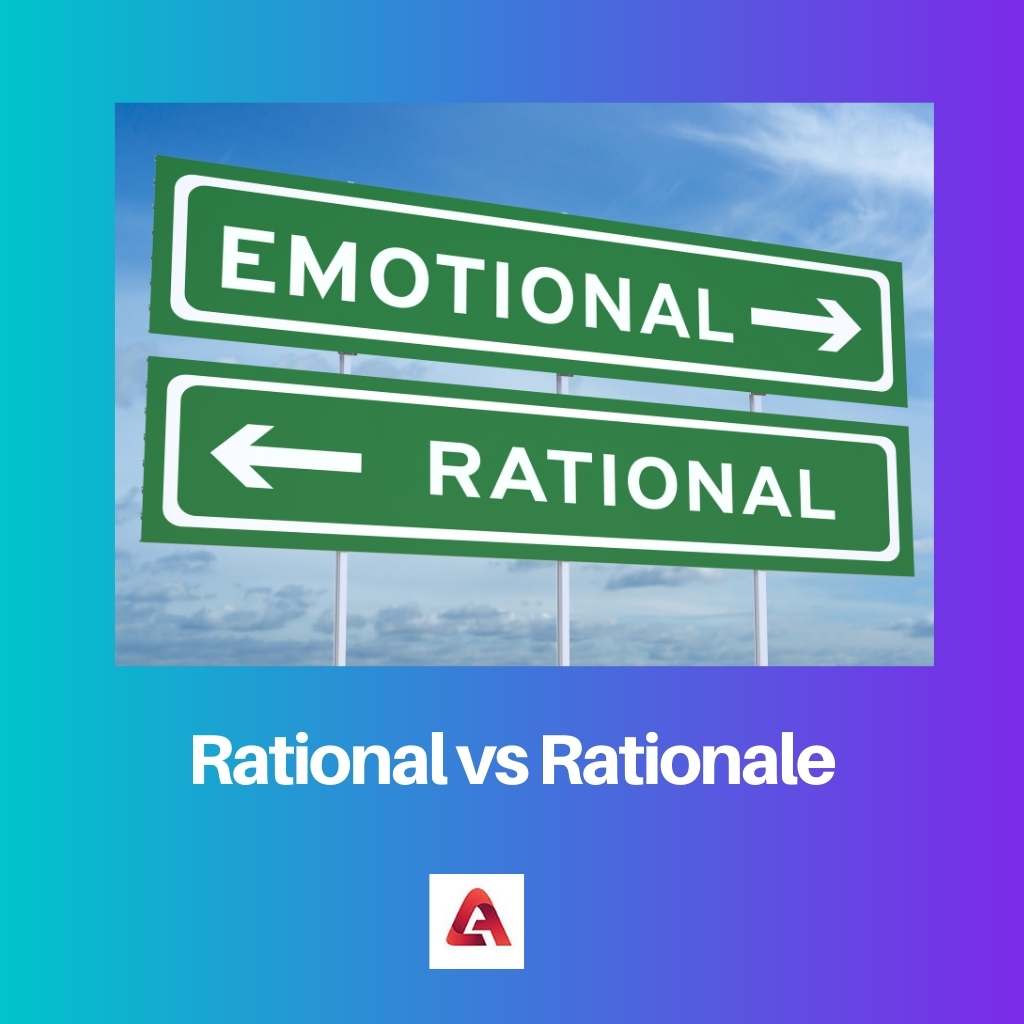There are multiple words in the English language that are similar to each other in pronunciation and spelling but can change the entire meaning of a sentence. For example, rational and rationale are three syllabus words, but their pronunciation varies slightly. Their use in forming a sentence is also different since one is an adjective, and the other is a noun.
Key Takeaways
- “Rational” is an adjective describing logical, reasonable thinking or behavior.
- “Rationale” denotes the underlying reasoning or justification for a decision or belief.
- Use “rational” to describe a person or action and “rationale” to explain the basis for a decision or belief.
Rational vs Rationale
Rational is an adjective that refers to something that is based on reason or logic rather than emotion. A person or decision can be described as rational if it is sensible, logical, and based on sound reasoning. The rationale is a noun that refers to the underlying reason or logic behind something.

The word Rational has been used in English since the 14th century. It is an adjective that refers to logical thinking and providing a sane and reasonable explanation for a work or a decision. The synonyms of rational are wise, reasonable, logical, perceptive, etc.
The word Rationale has been used in the English language since 1657, and it has its roots in Latin. It is a noun that refers to formal and informal arguments or documents to support a big course of action or plans. The synonyms of rationale are reasoning, hypothesis, arguments, etc.
Comparison Table
| Parameters of Comparison | Rational | Rationale |
|---|---|---|
| Meaning | Rational means someone’s ability to think clearly and provide a logical reason. | Rationale means to provide a set of logical documents or reasons behind a big course of action. |
| Part of speech | Rational is an adjective thus it can be used to describe a noun. | Rationale is a noun and itself represents proper reasoning or documents. |
| Pronunciation | Rational is a three syllabus word and it is pronounced as rash-uh-null. | Rationale is a three syllabus word and it is pronounced as rash-uh-nal. |
| History | English people started using the word Rational in the 14th century. | The word Rationale has its roots in the Latin language but it started gaining popularity in the English language in 1657. |
| Use | A person is called rational when he/she seems to come to a logical conclusion and provides proper reasoning for it. | One can present rationale either in form of legal documents or verbal reasoning depending on the profession. |
| Example | I am sure he has a perfectly rational explanation for what he did. | The chief financial officer asked her to provide a rationale for the large expense plan. |
What is Rational?
The word Rational is used as an adjective in a sentence. Though it has been used in English since the 14th century, it is originally derived from the Latin phrase rationalize. The meaning of the word rational is to be logical, think from a sane state of mind, and arrive at a reasonable conclusion. It is very commonly used in the English language to reflect the capabilities of a valid decision.
The word Rational is used in various senses. Some examples of how it can be used in a sentence are given below.
- He shows the characteristics of a rational man.
- A rational analysis leads to fruitful consequences.
- 3/10 is a rational number.
In the first two examples, the word Rational is used in the sense of arriving at a logical decision or showing capabilities to make a wise decision. In the third example, the word Rational is used to describe a type of number that can be expressed in the form of p/q such that q is not equal to 0.
What is Rationale?
The word Rationale is used as a noun in a sentence. Though it is used in English today and became popular in the mid-1600s, it is originally derived from Late Latin. The meaning of the word rationale is to produce a set of constructive arguments to support a course of action. It can be used to explain a hypothesis for a future course of events or a justification for something that happened in the past.
The rationale is the representation of both formal and informal sets of arguments. For example, one can use the word when presenting a formal document as well as during giving verbal reasoning for events. Given below are some examples of how to use the word Rationale in a sentence:
- The judge asked the man to explain his rationale for stealing a car.
- A politician must always explain his rationale for his position.
- The rationale for raising the drinking age is prevention for reducing car accidents.
Main Differences Between Rational and Rationale
- Rational means someone’s ability to think clearly and provide a logical reason, whereas Rationale means to provide a set of logical documents or reasons behind a big course of action.
- Rationale is used as an adjective, whereas Rationale is a noun.
- Rational is a three-syllabus word, and it is pronounced as rash-uh-null, whereas Rationale is a three-syllabus word, and it is pronounced as rash-uh-nal.
- English people started using the word Rational in the 14th century, whereas Rationale has its roots in Latin, but it started gaining popularity in English in 1657.
- A person is called rational when he/she seems to come to a logical conclusion and provides proper reasoning for it. On the other hand, one can present rationale either in form of legal documents or verbal reasoning, depending on the profession.



